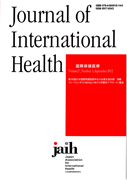All issues

Volume 27 (2012)
- Issue 4 Pages 337-
- Issue 3 Pages 207-
- Issue 2 Pages 111-
- Issue 1 Pages 1-
Volume 27, Issue 3
Displaying 1-4 of 4 articles from this issue
- |<
- <
- 1
- >
- >|
Opinion
-
Tomo Calain-Watanabe, Setsuko Lee2012Volume 27Issue 3 Pages 207-212
Published: September 20, 2012
Released on J-STAGE: October 11, 2012
JOURNAL FREE ACCESSIt is well established that restrictive policies on immigration increase the risk of perinatal mortality and morbidity among migrant women. Undocumented pregnant women and their newborn babies are particularly at high risk of complications, due to multiple and interacting factors such as: (i) limited access to health care, (ii) social isolation, (iii) financial burdens, and (iv) trans-generational effects.
In Japan, in response to the increase in foreign residents since the 1990s, laws and regulations on social protection are being readjusted. Accordingly, the ‘New Residency Management’ system will be introduced in July 2012 to better accommodate the needs of ‘legal’ foreign migrants. At the same time, undocumented migrants will face tougher restrictions. All the undocumented migrants will be denied registration in the new system unless they come forward to the Immigration Bureau. As a result, they could also be denied welfare services provided up to now by municipalities.
In this article, we discuss the potential impact of the forthcoming New Residency Management system on the health of undocumented pregnant migrants and their children.
More research is needed on this issue in the Japanese context, but we should not fail to guarantee minimal public assistance for undocumented migrant women, particularly at the time of childbirth.View full abstractDownload PDF (113K)
Infomation
-
Yuki Nakagawa, Leo Kawaguchi, Michiyo Higuchi, Nobuo Kawazoe, Chifa Ch ...2012Volume 27Issue 3 Pages 213-223
Published: September 20, 2012
Released on J-STAGE: October 11, 2012
JOURNAL FREE ACCESSIntroduction
The use of medicines among Brazilian workers in Japan has not been documented. This study examines the preferences and use of medicines among Brazilian workers of Japanese origin in Japan.
Methods
A cross-sectional survey was conducted in 2011 in a community in Nagoya, where many Brazilian workers lived. Questionnaires were distributed to 206 Brazilian households, and asked about preferences and use of Japanese or Brazilian medicines. Associations with socioeconomic factors were analyzed using Fisher's exact test.
Results
The response rate was 36% (74 households). Of these, 66% had lived in Japan for over 10 years, and 88% held health insurance. Over 80% reported a preference for Japanese medicines. However, Brazilian medicines were used in more than 40% of the households. Employed Brazilians tend to use Brazilian medicines compared to the unemployed. Most respondents answered that Brazilian medicines were more effective, but were more expensive and produced worse side effect than Japanese medicines.
Households with children showed a preference for Japanese medicines for children's illnesses. However, more Brazilian medicines were used when the length of household's stay in Japan was less than 10 years, and when the respondent's perceived listening ability of Japanese language was poor.
Conclusion
Almost all respondents were using the medicines they preferred, suggesting that access to medicine was generally good in the community. However, 40% of respondents used Brazilian medicines, despite their long stay in Japan, their health insurance status, and their recognition of Japanese medicines as inexpensive and safe. This might be explained by familiarity with Brazilian medicines, or perception of their effectiveness.
Continuous self-administration of medicines without consultation has potential harm to the health. This study also suggests the importance of arranging social environments such as facilitating the taking of sick leaves, so that immigrant workers can secure their access to health services.View full abstractDownload PDF (624K)
The Abstracts of the 26th Annual Meeting of Japan Association For International Health, 2011 Joint Conference
-
2012Volume 27Issue 3 Pages 225-321
Published: September 20, 2012
Released on J-STAGE: October 11, 2012
JOURNAL FREE ACCESSDownload PDF (427K)
A report on the Forum “Interdisciplinary Approach to Post MDGs”
-
Satoru Watanabe2012Volume 27Issue 3 Pages 323-324
Published: September 20, 2012
Released on J-STAGE: October 11, 2012
JOURNAL FREE ACCESSDownload PDF (162K)
- |<
- <
- 1
- >
- >|